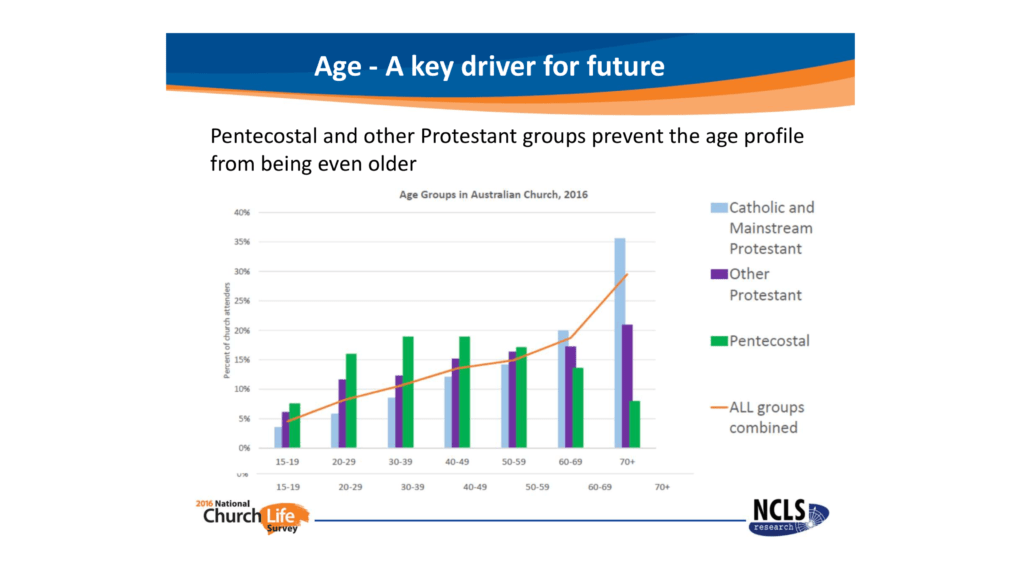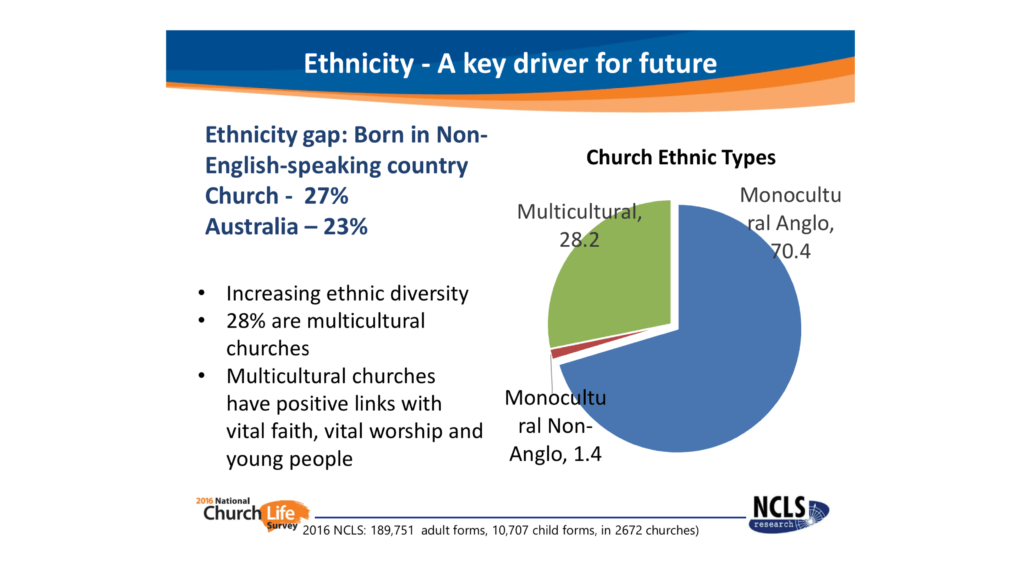Pastors have been challenged to redirect the focus of their evangelistic efforts from people outside the church to the families already in their congregations.
The Director of NCLS Research, Ruth Powell, believes it is critical for the future health of the church that pastors equip parents to pass on their faith to their children as this is the main way people become Christians.
“Family members are key for sharing faith,” she told a recent conference at which she presented the results of the 2016 National Church life Survey.
“When you find out why someone is a Christian today – who was the role model – it’s a family member. It’s their mother first, followed by their father, other family members, often grandparents, and they say ‘these are the people who showed me what faith was about and passed on faith to me.’ If we want to invest in spiritual life, this is key.
“I think we miss the boat when we only try to get people to share faith with others. We need to practise and learn and invest in helping families share faith with family members because this is where it happens most.
“And I don’t think a lot of our missions are actually investing in thinking about how to resource our churches in this area.”
 Powell said passing on faith to the next generation was critical because there was a dramatic age gap between the church and wider community – with about half of church attenders over 60 compared with 26 per cent in the community.
Powell said passing on faith to the next generation was critical because there was a dramatic age gap between the church and wider community – with about half of church attenders over 60 compared with 26 per cent in the community.
This age gap would be even higher if not for the influence of Pentecostal churches.
While data from the latest NCLS in 2016 shows a slowing in the decline of church attendance, with even some growth in the Protestant churches, she warned that this was likely to be short-lived.
“The tough news is, with that age profile, that plateauing will not last. We’ve gone down, we’re flat for a while and – unless something dramatic changes – we will go down again,” she said.
“That’s just a demographic factor and that’s where the conversation about generational transition of faith comes in and how we pass on the power to the next generations.”
 On a positive note, Powell said the Australian church faced an incredible opportunity for flourishing thanks to its high rate of multicultural churches.
On a positive note, Powell said the Australian church faced an incredible opportunity for flourishing thanks to its high rate of multicultural churches.
“In the churches, we have more people born in a non-English-speaking country than are in the wider community,” she said.
“I think this is an extraordinary opportunity for the church. We have perhaps the highest proportion of multicultural churches in the world. For example, 28 per cent of our churches are described as multicultural. When you compare that to the US, they have 14 per cent who are multicultural churches. We are a highly multicultural expression of church life.”
“We need to build relationships within multicultural churches – this is part of the future healthy church picture.” – Ruth Powell
Powell said NCLS Research’s work reveals that the more multicultural and ethnically diverse a church is, that translates into a positive relationship between vital faith, vital worship and the presence of young people.
However, she said, there was a negative relationship between being a multicultural church and having strength in vital connections with each other.
“What that says to me is if there’s ethnic or cultural diversity in a church, if we cannot harness that, we have to be more attentive strategically to working on relationships between people of different cultural backgrounds within our churches – because we’re not quite getting that right,” she said.
“We need to build relationships within multicultural churches – this is part of the future healthy church picture. We have to be intentional and strategic and help our churches build cross-cultural, intercultural communication and trust and that will be part of building a healthy church into the future.
“If we don’t attend to that, then we will lose this beautiful, incredible opportunity of the Australian church to be a multicultural church.”
Powell said a surprising finding from the NCLS research was that worship is itself a core mission activity to reach newcomers, rather than being just for the faithful.
“I know sometimes we think it’s for insiders and we have to work out how to move beyond – but it is, in reality, a core mission act of the church,” she said.
“We have to understand that newcomer, that visitor, is walking in and making an evaluation about our faith, based on their experience of worship. How we invest in that is really a key strategic response.”
“It’s a place where you can discuss and deepen faith.” – Ruth Powell
Powell said there also had been an incredibly sharp line upwards in the proportion of attenders who said they experienced inspiration during their worship service.
“What I think has been going on in church life is that there has been an investment in music and creativity and aesthetics and you see the traditions borrowing from each other,” she said.
“You know, all the churches across every faith tradition will sing Hillsong songs. But you also have the neo-monastic Baptist traditions, you have the meditative practices, you have people journeying with a capella, Taize [meditative singing], Iona [Community] … you have liturgical practices in Baptist churches, and responsive readings.
“We have people experimenting with things such as messy church, different things where people are engaging and expressing worship in all sorts of creative ways, using all sorts of resources. I think this is an encouragement in terms of what the churches are doing.”
One area that has experienced dramatic uplift over the past 25 years is in the number of church attenders who engage in small groups (Bible studies).
“There’s been an incredible increase in the proportion of Protestant church attenders in small groups. What is going on here? I think it’s been discovered to be an incredibly useful tool, useful way of being church together,” Powell said.
“It feeds intimacy, a chance to get to know people better. It works for individuals and I think it feeds people who can pitch at different educational levels.
“It’s a place where you can discuss and deepen faith.”


